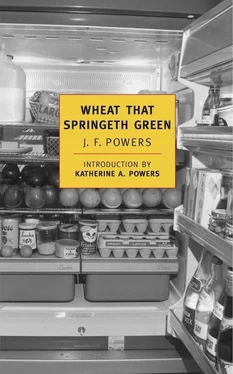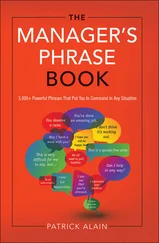J. Powers - Wheat That Springeth Green
Здесь есть возможность читать онлайн «J. Powers - Wheat That Springeth Green» весь текст электронной книги совершенно бесплатно (целиком полную версию без сокращений). В некоторых случаях можно слушать аудио, скачать через торрент в формате fb2 и присутствует краткое содержание. Год выпуска: 2000, Издательство: NYRB Classics, Жанр: Современная проза, на английском языке. Описание произведения, (предисловие) а так же отзывы посетителей доступны на портале библиотеки ЛибКат.
- Название:Wheat That Springeth Green
- Автор:
- Издательство:NYRB Classics
- Жанр:
- Год:2000
- ISBN:нет данных
- Рейтинг книги:5 / 5. Голосов: 1
-
Избранное:Добавить в избранное
- Отзывы:
-
Ваша оценка:
- 100
- 1
- 2
- 3
- 4
- 5
Wheat That Springeth Green: краткое содержание, описание и аннотация
Предлагаем к чтению аннотацию, описание, краткое содержание или предисловие (зависит от того, что написал сам автор книги «Wheat That Springeth Green»). Если вы не нашли необходимую информацию о книге — напишите в комментариях, мы постараемся отыскать её.
Wheat That Springeth Green — читать онлайн бесплатно полную книгу (весь текст) целиком
Ниже представлен текст книги, разбитый по страницам. Система сохранения места последней прочитанной страницы, позволяет с удобством читать онлайн бесплатно книгу «Wheat That Springeth Green», без необходимости каждый раз заново искать на чём Вы остановились. Поставьте закладку, и сможете в любой момент перейти на страницу, на которой закончили чтение.
Интервал:
Закладка:
“Took longer than I thought.” Joe hadn’t said where he was going, only “Some calls to make,” which, though, had turned out to be the truth by the time he’d tracked his old confessor back to the hospital and found him snoring in his bed. “Sorry, Greg.”
“No harm done,” Father Felix said. “Gave us a chance to rap.”
Joe, thinking the word would soon be obsolete but not soon enough, seated himself in his BarcaLounger — it was warm. Bill? Father Felix? Bill.
“Greg was telling us about his draft problem,” Bill said to Joe.
“Care to tell me about it, Greg?”
“You already know. Barb told you.”
Barb, huh? “Your mother didn’t tell me much. I didn’t ask her to. Thought I’d wait and ask you.”
“Against war, is all. Lotta shit.”
“Now, now,” said Father Felix. “We’re all against war, if it comes to that, Greg.”
“ If? You mean until .”
True, Joe thought.
“It hasn’t come to that yet,” Father Felix said. “This war is still undeclared, Greg.”
“For you, not for me.”
True, Joe thought.
Bill said, “Greg told us he was a language major before he dropped out of college, Joe.”
“So?”
“So we were wondering if he could maybe go on with his education in the service — maybe learn Russian.”
“Or even Chinese,” said Father Felix.
Joe, sorry but not surprised to see Greg close his eyes and shake his head in dismay as seen on TV, said, “Not his immediate problem, is it — going on with his education?”
“Maybe not,” Bill said, “but I understand only one in ten sees action.”
Greg opened his eyes. “I don’t intend to be one of the ten, or the nine. And I don’t intend to throw myself on the mercies of my local draft board as a c.o.”
“You’d be wise not to do that,” Father Felix said. “Greg, if it’s such a matter of conscience with you and worst comes to worst shoot at their legs. That’s what I’d do.”
“I can’t tell — is he kiddin’?” Greg said to Joe.
“Afraid not.” Joe got up to go to the bathroom, saying, “I’ve heard that one before, though not recently. In the seminary. It’s a crazy world.”
“That may be,” Father Felix said, his voice following Joe into the bathroom, “but there’s more than one way to be against war and —what’s more to the point — to work for peace.”
“Shoot over their heads?” said Greg.
Joe, listening to their conversation while he made himself a drink in the bathroom, appeared among them again, still listening.
“Greg, have you thought— enough , I mean — of your folks?” said Bill.
“And your brother in Nam?” said Father Felix.
“Don’t forget the fuckin’ neighbors,” said Greg.
Joe — he’d heard enough — spoke then.
WITH SOME AUTHORITY
Since he was (and the fathers, here, weren’t) Greg’s pastor, and since he had given some thought to the subject of war, more than most people and certainly more than most clergy [“Humph!” said Father Felix], including St Thomas Aquinas and the late Cardinal Spellman [“Dear me!” said Father Felix], he (Joe) spoke with some authority and wished, if possible, to be heard [“Humph!” said Father Felix].
HOPING FOR BEST
The fathers, here, wanted Greg to go on with his education and to enjoy the benefits he’d have coming to him, not least the respect and gratitude of the nation—“It says here”—and of the copulating neighbors [“Joe, this is a serious business,” said Father Felix, and Bill nodded]. The fathers, here, also wanted Greg to realize that if he followed another course he’d be giving himself, and those near and dear to him, a lot of grief. He’d be in jail, or on the run, marked for life. So Greg should be in no doubt that the fathers, here, meant well by him and hoped for the best.
INVIDIOUS COMPARISON
But then the fathers, there , in Italy and Germany, during the Second World War and before — Abyssinia and Spain — had also meant well by their people and hoped for the best.
“An invidious comparison!” cried Father Felix. “The Italian and German clergy were placed in a very unfortunate position in the Second World War.”
“As they were in the First World War,” Joe said, “enemies then, marching to different drummers, actually the same one, not hating each other, though, only hating each other’s ideas . Used to hear that one a lot during the last war — last but two, I mean.”
“I didn’t,” said Father Felix.
“Never heard it?” said Joe.
“Rarely,” said Father Felix. “In any case, Joe, judge not, lest ye…”
“Gotcha. Dresden, Hiroshima, Nagasaki.”
PASSING THE BUCK
For the faithful to have followed another course in Germany would have meant, as it did mean for a few, the ax — literally. Heroic virtue had been called for, and this for most people, paralyzed or galvanized by nationalism, the bad wine of the country, was unthinkable — literally. [“Don’t blame the clergy,” said Father Felix.] The German clergy, knowing what people are like in wartime and not being so different themselves — as we aren’t — had once again passed the buck, which was passed on to their dear brothers in Christ in, for a start, Czechoslovakia, then Poland, then France. Dulce et decorum est pro patria mori! How sweet and meet it is to die for my country! And to take a few with me, with ecclesiastical approbation. That the faithful — faithful to what? — expect no more from themselves and the Church, this is the world’s worst and longest-running scandal. [“Don’t blame the Church,” said Father Felix.]
JESUS WEPT
Those words were said to be the saddest ever written, but that was before the conditions for a just war were written. Namely, that there be grave and just cause for war, that it be declared and conducted according to law, that it not be protracted, that the peace be just, and so on. These conditions, written in the days of “the Christian Prince” (who’d reigned only in the minds of theologians), hadn’t been met then, and today, more than ever before, were unmeetable, and yet were still serving as an out. [“Don’t blame the theologians,” said Father Felix.]
PRIMACY OF CONSCIENCE
The just-war theologians would have a lot to answer for in the next world. In holding that conscripts could usually presume that their country was right, and if in doubt could prudently acquiesce because the civil and ecclesiastical authorities were probably right, and if wrong could not be blamed if acting in conscience, St Thomas and others had dated badly. But what they had said about the primacy of conscience [“An informed conscience,” said Father Felix, and Bill nodded], informed or not, if sincere, was still true. The authorities today could no more vouch for the consciences of others than the Christian Prince could in the Thirteenth, the Greatest — or Hitler or Mussolini could in the Twentieth, the Crappiest — of Centuries. Or FDR. Or JFK. Or LBJ. “Think of him closeted with his advisers, agonizing over meeting the conditions for a just war.” The Church’s problem, however (though you’d never know it), is not the odd conscientious objector, or even the unconscientious objector to war but the mass of conscientious, not so conscientious, and unconscientious acceptors of war — and herself. The Church, in playing footsie with the powers that be, from Constantine to LBJ, had been remiss.
“ Remiss? ” said Greg. “You mean chicken .”
“O.K.,” Joe said. “I’ll buy that.”
“No, no,” said Father Felix.
“Joe,” said Bill.
DISHONEST DIOGENES
Читать дальшеИнтервал:
Закладка:
Похожие книги на «Wheat That Springeth Green»
Представляем Вашему вниманию похожие книги на «Wheat That Springeth Green» списком для выбора. Мы отобрали схожую по названию и смыслу литературу в надежде предоставить читателям больше вариантов отыскать новые, интересные, ещё непрочитанные произведения.
Обсуждение, отзывы о книге «Wheat That Springeth Green» и просто собственные мнения читателей. Оставьте ваши комментарии, напишите, что Вы думаете о произведении, его смысле или главных героях. Укажите что конкретно понравилось, а что нет, и почему Вы так считаете.












